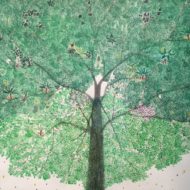 Teresa Numerico is a lecturer at the University of Rome, where she teaches history and philosophy of computer science and epistemology of new media. Her presentation brought a historical and philosophy of science perspective into the themes of this conference: web search, search engines and the society of the query. She attempted to see search engines today through the lenses of cybernetics. According to her, digital technologies today intertwine the cybernetics concepts of communication and control. Just as cybernetics had to deal with communication and control, so search engines today mediate between cooperation and monopoly.
Teresa Numerico is a lecturer at the University of Rome, where she teaches history and philosophy of computer science and epistemology of new media. Her presentation brought a historical and philosophy of science perspective into the themes of this conference: web search, search engines and the society of the query. She attempted to see search engines today through the lenses of cybernetics. According to her, digital technologies today intertwine the cybernetics concepts of communication and control. Just as cybernetics had to deal with communication and control, so search engines today mediate between cooperation and monopoly.
But how more precisely is the cybernetics approach embedded into search engines? According to Teresa Numerico, there are areas in which search engines have a lot in common with the cybernetic approach to machines and creating a cognitive framework, such as: search engines are black boxes in that the ranking process is not transparent, the search function offers output almost automatically to external input, and the ranking algorithm hypothesizes the self-organization within the network.
By offering a strong cognitive framework, search engines are doing the work of the archive, hence her call for an “archaeology of techno-knowledge of search.” Her notion is influenced by Foucault’s Archaeology of Knowledge. According to Foucault, “The archive is the first law of what can be said. […] But the archive is also that which determines that all these things said do not accumulate endlessly in an amorphous mass […]; but they are grouped together in distinct figures composed together in accordance with specific regularities.” (Foucault, 1969/1989: 145- 148).
Her main questions in relation to this direction of research into search engines were: Who controls the archive and its meanings?, as we have no control on the meaning that comes out this work; Who is defining the web society archive?, and ultimately, what is there to be done? According to Teresa Numerico, the only possible reaction is resistance. She concluded her presentation with a practical list of suggestions for potential actions of resistance which any of us can take: be creative, not communicative, in order to elude the control component of communication, as well as archiving and searching, minimize the number of online tracks that you leave, close internet devices every now and then, make efforts to vary your sources of knowledge by consulting different search engines, and maintain a cross-media orientation in order to verify the trust and authority of one source against others.
Photos by Anne Helmond.

